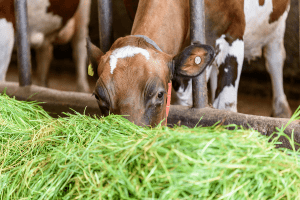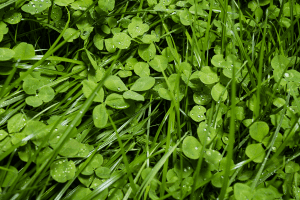The dairy industry is showing sustainable production comes in all shapes and sizes, and in all systems, whether housed or grazing. But the common thread in sustainable dairy production is the ability to operate efficiently. Germinal Agricultural Director Ben Wixey explains why.
Sustainable dairy production
It is no coincidence there is a strong link between sustainability and profitability. The efficient production of each litre of milk or kg of milk solids using the least inputs leads to sustainability. And whatever the system, quality forage drives this production.
High-quality, consistent forage is the backbone of higher-yielding, all-year-round housed herds. For these dairy systems, the Aber High Sugar Grass (HSG) range, rated for its metabolisable energy (ME) yield, balances energy and protein to maximise production.

The readily available energy helps rumen bacteria convert more of the grass protein meaning increased milk production from the same level of inputs.
Highly ranked Germinal grass seed varieties
Aber HSG grass seed varieties, alongside other Germinal grass and clover varieties, consistently appear in the top ranks of the Recommended Grass and Clover lists (RGCL) across the UK.
If you don’t do anything different on the farm apart from using Aber HSG varieties, you will increase the energy produced per hectare, even when compared to other seed varieties on the recommended lists.
For example, based on the 2022/23 RGCL figures, using the top-ranked Aber HSG varieties equates to around 950 litres of extra milk yield/hectare per year compared to other varieties. This is a significant amount of yield driven by higher-quality forage without any extra inputs.
Benefits of sward diversity
For lower-yielding, grazing-based systems, there are also specialist Germinal seed varieties to help push sustainable efficient production. Alongside its high-quality grasses, there is a growing demand for Germinal clovers and more diverse swards.

The superior nutritional profile of these mixed swards comes with the environmental advantages of being able to fix nitrogen, have a higher tolerance to drought and increase the soil’s nutrient content. All these characteristics help drive sustainable cattle grazing throughout the season.
Clover and multi-species seeds also offer flexibility to grassland farmers. As well as being sown within a full reseed, they can be stitched into existing leys to provide additional sources of protein and energy. This is a sustainable and economic way of driving forage production and low-cost milk yield when a full reseed is not required.
Talk to the Germinal experts about sustainable dairy production
Submit the form below to discuss sustainable dairy production with one of our grass and forage experts.
